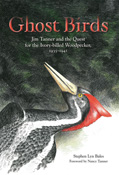Ghost Birds
Jim Tanner and the Quest for the Ivory-billed Woodpecker, 1935-1941

“Everyone who is interested in the ivory-billed woodpecker will want to read this book—from scientists who wish to examine the data from all the places Tanner explored to the average person who just wants to read a compelling story.”—Tim Gallagher, author of The Grail Bird: The Rediscovery of the IVory-billed Woodpecker
In 1935 naturalist James T. Tanner was a twenty-one-year-old graduate student when he saw his first ivory-billed woodpecker, one of America’s Istudent when he saw his first ivory-billed woodpecker, one of America’s rarest birds, in a remote swamp in northern Louisiana. At the time, he rarest birds, in a remote swamp in northern Louisiana. At the time, he was part of an ambitious expedition traveling across the country to record and photograph as many avian species as possible, a trip organized by Dr. Arthur Allen, founder of the famed Cornell Lab of Ornithology. Two years later, Tanner hit the road again, this time by himself and in search of only one species—that ever-elusive ivory-bill. Sponsored by Cornell and the Audubon Society, Jim Tanner’s work would result in some of the most extensive field research ever conducted on the magnificent woodpecker.
Drawing on Tanner’s personal journals and written with the cooperation of his widow, Nancy, Ghost Birds recounts, in fascinating detail, the scientist’sdogged quest for the ivory-bill as he chased down leads in eight southern states. With Stephen Lyn Bales as our guide, we experience the same awe and excitement that Tanner felt when he returned to the Louisiana wetland he had visited earlier and was able to observe and document several of the “ghost birds”—including a nestling that he handled, banded, and photographed at close range. Investigating the ivory-bill was particularly urgent because it was a fast-vanishing species, the victim of indiscriminant specimen hunting and widespread logging that was destroying its habitat. As sightings became rarer and rarer in the decades following Tanner’s remarkable research, the bird was feared to have become extinct. Since 2005, reports of sightings in Arkansas and Florida made headlines and have given new hope to ornithologists and bird lovers, although extensive subsequent investigations have yet to produce definitive confirmation.
Before he died in 1991, Jim Tanner himself had come to believe that the majestic woodpeckers were probably gone forever, but he remained hopefulthat someone would prove him wrong. This book fully captures Tanner’s determined spirit as he tracked down what was then, as now, one of ornithology’s true Holy Grails.
STEPHEN LYN BALES is a naturalist at the Ijams Nature Center in Knoxville,Tennessee. He is the author of Natural Histories, published by UT Press in 2007.
